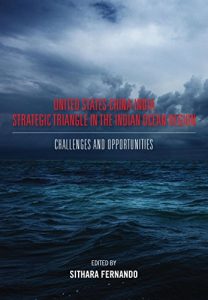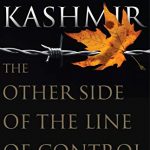
United States-China-India: Strategic Triangle in the Indian Ocean Region: Challenges and Opportunities by Sithara Fernando is an anthology on the dynamism of power equilibrium in the Indian Ocean Region (IOR). The essays primarily focus on the potential of the triangle formed by a global hegemon (the United States), a striving regional power (India), and a rising economy (China). The above-mentioned countries are crucial for determining the future of the region and shaping its economic and strategic capabilities. Scholars from all around the globe from different sectors like strategic, academic, etc. have contributed to this book.
As the name suggests, the anthology examines the potential of cooperation (opportunities) and competition (challenges) among extra-regional and regional powers in the region. According to the scholars, the main actors determining the nature of the region are the United States (US), India, and China. The triad and the bilateral relationships between India-US, India-China, and US-China deeply impact the domestic and foreign conduct of small island regional states like Maldives, Seychelles, Vietnam, etc. The most important of these regional powers is Sri Lanka, as the scholars have pointed out its growing importance in the region due to its strategic geopolitical location.
Written in the year 2015, the book provides a foundation stone for the understanding of not only IOR but also the power balance in the Pacific Ocean between the US and China. It traces the economic and strategic expansion of the Pacific Ocean to the Indo-Pacific and finally to the Asia-Pacific region. It seeks to explain the shift in focus of international relations from the Pacific to the Indian Ocean and sheds light on the intensification of relations between the two water bodies in the 21st century.
The scholars through their research, analysis, and experience have attempted to answer mainly 4 questions-
- What are the prospects of competition and cooperation within the strategic triangle?
- What structure or pattern will the triangular relations assume?
- How can stability be maintained in the triangular relationship in the interest of peace in the IOR?
- What would be the impact of this strategic triangle on a small country such as Sri Lanka situated in a geopolitically significant location in the IOR?
The book starts by providing the US, Indian as well as Chinese perspectives of the region. The authors of each perspective map out the relevance of the IOR for their respective national interests. For the US, the main interest is to maintain its hegemony which it established during the cold-war years; for India, the main stake is to become the most influential regional power and keep the interference of extra-regional powers (like the US) at bay; and for China, the main motive is to secure the trade routes through which it imports energy resources, oil etc. China, comparatively being the latest entry among all three, is using its cultural influence and economic prowess to befriend small regional nations and secure its national stakes. All the 8 contributing scholars have pointed to the fact that the Chinese advance in the region has no intentions of culminating into military or strategic power and it only seeks to limit itself to economic power. Though the then (2015) analysis of the scholars might not be very true for the present circumstances and nature of relations among the three, this is particularly useful for understanding the rise of China and the associated increasing proximity between the US and India.
The editor Sithara Fernando himself, in order to answer the first question, builds on the theories of realist and social constructivists scholars. ‘Realism emphasizes the struggle for power among states and the need to forge alliances based on national interests. Social constructivists emphasize the link between particular normative structures at the international level. Socialization is said to involve the development of shared identification through which people become members in a society.’ The school of social constructivism becomes important as it brings the non-traditional security threats (or NTS) like piracy, trafficking, smuggling, environmental threats, maritime terrorism etc. into the discourse. The NTS binds all the actors, weak or strong alike, in the IOR together as it affects the national interests of everyone. It abandons the triad relationship to take ‘all against all’ or ‘two against one’ form.
Another major theme on which the scholars have pondered on is the role of Sri Lanka in the triad relationship. Given the geographically significant position of the island nation and its relation with India and China specifically have brought it to the front of the IOR discourse. The Chinese intervention in the nation through the Hambantota project has invited criticism for the island especially from the US and India. They see Sri Lanka’s support to China as the violation of the sanctity of its bilateral regulations with them. Authors like Sithara Fernando, Prasanna Alahakoon, and Y.N. Jayarathna argue that Sri Lanka should use its special geopolitical space and ‘pursue a strategy of maintaining good relations with all three countries without aligning itself….to pursue its national interests without compromising its foreign policy autonomy.’
Scholars have also pointed out that both the countries are wary of Chinese entry in the region as it directly gives a challenge to their position. The US named the strategy of China’s rise as ‘string of pearls’ which basically is to encapsulate India and its influence. To counter the expansion of China, the US started supporting India and its bid for becoming a regional power. According to the scholars, this was the turning point in the bilateral relationship of both nations, and today both democracies are acting maturely, keeping their differences aside and prioritizing the development of the region. However, this approach might not establish peace in the region which may give way for NTS to disrupt the potential of the area, thereby affecting every country’s stake. Mr. Fernando suggests that for extracting the most benefit out of the triangular relation, the US and India will have to get rid of the ‘China Threat Theory’. ‘The triangle can be a peaceful and stable regional framework to promote regional development by sharing interests, risks, and responsibilities.’
The essays collectively point to the fact that the vastness of the IOR does not allow any one country to establish its monopoly. Any country, irrespective of its naval or economic power will need to solve the problem of NTS. The key to the security of all the national interests lies in the active cooperation of all the powers, extra-regional and regional. ‘A peaceful and stable international environment has always been the ultimate goal of every country so the zero-sum game will never become the strategic option for rational powers.’















